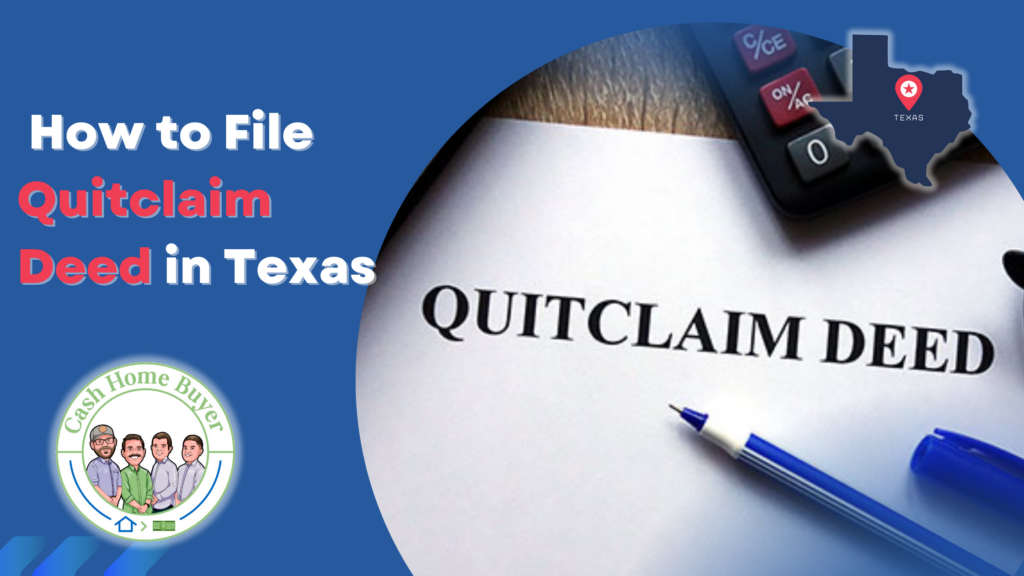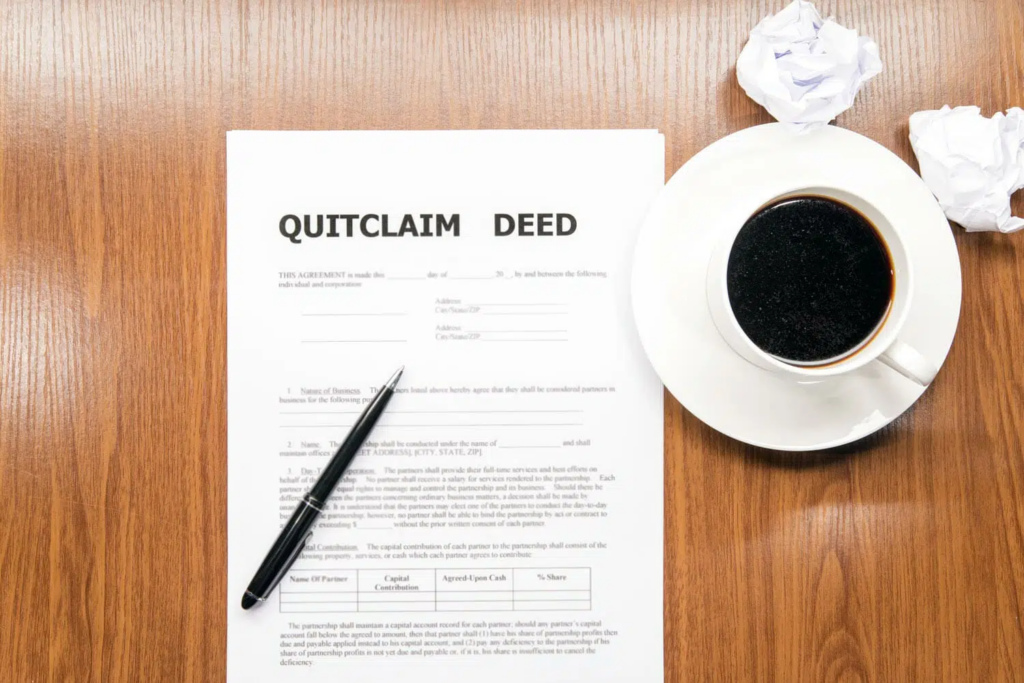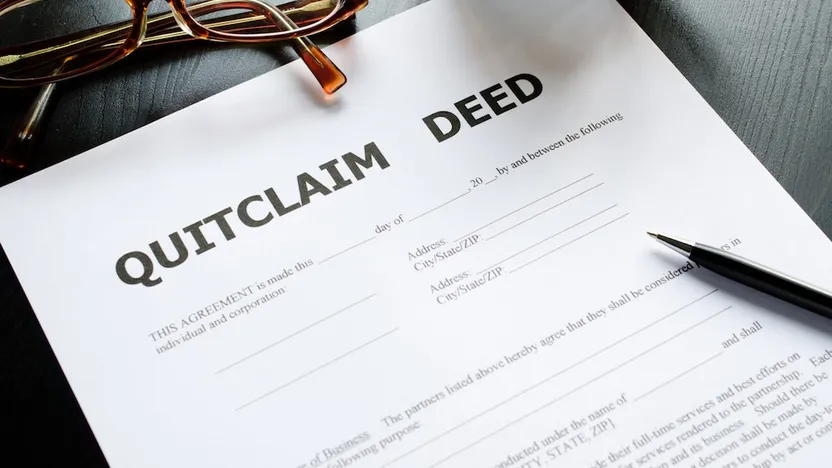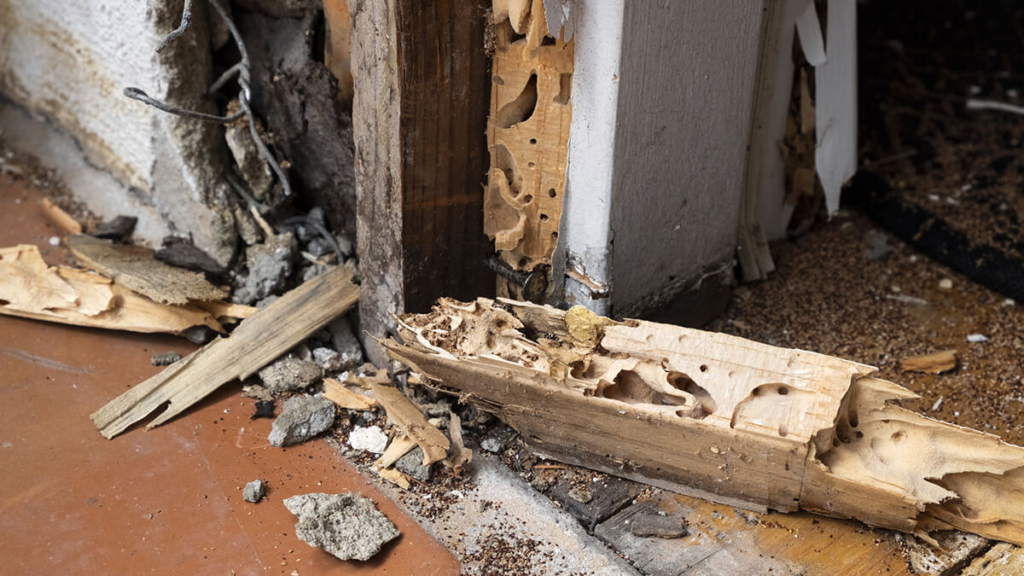
What is a Quitclaim Deed?
A quitclaim deed is a legal document that transfers property ownership without guaranteeing the title. Unlike other deeds, it doesn’t assure the property is free of liens or claims. This deed is often used in non-sale scenarios, like transferring property among family members or during divorce settlements.
Features of Quitclaim Deed:
- Transfer of Ownership: The grantor transfers any interest in the property to the grantee.
- Real Estate Transactions: These are often used in real estate situations that do not involve a traditional sale.
- No Title Warranty: Offers no guarantee that the grantor has valid ownership rights.
Using a quitclaim deed in Texas requires a clear understanding of its impact on legal rights and property ownership.
Who Can Use a Quitclaim Deed in Texas?
Anyone looking to transfer property interests without warranty can use a quitclaim deed in Texas. However, it’s best suited for certain situations:

Eligibility and Usage:
- Property Co-owners: Those wanting to consolidate interests into one owner.
- Family Members: Transfers between relatives where title assurance isn’t crucial.
- Divorce Settlements: Transfer property from one spouse to another after asset division.
Using a quitclaim deed requires understanding the situation and ensuring all parties know its limitations in real estate transactions.
Are There Limitations to Quitclaim Deeds?
Quitclaim deeds have specific purposes but come with risks and limitations that should be understood:
Risks and Legal Limitations:
- Lack of Warranty: These deeds don’t provide a warranty of title, meaning they don’t protect against third-party claims.
- Potential Issues: The grantee might face legal challenges if the grantor lacks clear ownership.
- Title Protection: They don’t offer the protection found in warranty deeds, which is important for securing the property title.
For those considering a quitclaim deed in Texas, evaluating these drawbacks and seeking legal advice if necessary is wise.
How Does Property Transfer Work with Quitclaim Deeds?
What Are the Steps Involved in Transferring Property?
Transferring property using a quitclaim deed is straightforward but requires attention to detail. A quitclaim deed is a legal tool used for simple property transfers without title guarantees. Follow these steps for a successful deed transfer:

- Prepare the Quitclaim Deed:
- Identify the current owner (grantor) and the new owner (grantee).
- Include an accurate legal description of the property.
- Verify that all information provided is correct and up-to-date.
- Execute the Deed:
- Both parties must sign the deed before a notary public to confirm authenticity.
- Ensure signatures meet the requirements for a Texas property deed transfer.
- File the Deed:
- Submit the signed deed to the local county recorder’s office where the property is located.
- Pay any required filing fees.
- Update Ownership Records:
- Once recorded, the deed reflects the change in property ownership.
- Verify that public records now show the updated ownership.
By following these steps, you ensure a proper quitclaim deed transfer. Adhering to legal requirements helps prevent future issues.
When Should You Consider Hiring a Lawyer?
Hiring a lawyer during a property transfer can provide valuable guidance and protect your rights. Here are situations when professional assistance is advisable:
- Complex Transactions: If the transfer involves complex details or multiple parties, a real estate attorney can help clarify any issues.
- Estate Planning: Lawyers can integrate a quitclaim deed into broader estate strategies, aligning with your long-term goals.
- Disputes or Challenges: Anticipating disputes over ownership or rights? A lawyer can help address these proactively.
- Understanding Legal Documents: A lawyer can interpret documentation, ensuring you understand all legal obligations.
Professional legal assistance ensures the transaction is handled correctly and offers peace of mind during the property transfer process.
How Does the Notarization Process Work?
Notarization is essential for verifying the authenticity of a quitclaim deed. Here’s how this process works:
- Locate a Notary Public:
- Find a certified notary public authorized to notarize documents in your area.
- Verify Signatures:
- The notary confirms that all signatures on the deed are genuine and made voluntarily.
- Review of Documents:
- The notary checks the deed to ensure it meets legal standards and requirements.
- Record Notarization:
- The notary will sign and stamp the document, adding a seal that validates the signatures and date.
- Complete the Process:
- After notarization, file the document with the appropriate county recorder’s office.
Notarization secures the legal integrity of the property transfer by verifying signature authenticity and compliance with legal requirements.
Legal Compliance and Filing Procedures
Where Do You File a Quitclaim Deed in Texas?
In Texas, a quitclaim deed is filed with the county clerk’s office where the property is located. To properly record the document, follow these steps:

- Prepare the Quitclaim Deed: Complete the deed with all required information about the grantor and grantee. Use a form that meets Texas state statutes.
- Sign and Notarize: The grantor must sign the deed before a notary public.
- Deliver the Deed: Give the notarized deed to the grantee, who should then file it with the county clerk.
- Record the Deed: Go to the county clerk’s office to record the deed officially. This step protects the grantee’s legal rights by documenting the property transfer.
- Filing Requirements: Check the county’s specific requirements, as they can vary. These may include providing a legal property description and paying applicable fees.
Following these steps helps ensure you record a quitclaim deed in compliance with Texas regulations.
How Much Does It Cost to File a Quitclaim Deed?
Filing a quitclaim deed in Texas involves several costs:
- Filing Fee: Each county sets its fee for recording a quitclaim deed. This fee is generally modest and covers processing.
- Other Expenses: Additional costs can include notary fees, which are necessary for legal validation, and fees for obtaining certified copies of the deed.
- Texas Quitclaim Deed Costs: Costs may vary depending on the transaction’s complexity and whether legal advice or services are needed.
Contact the local county clerk’s office about filing a quitclaim deed in Texas for accurate expense information.
What Are the Legal Consequences of Incorrect Filing?
Incorrect filing of a quitclaim deed can lead to serious legal issues:
- Improper Documentation: If the deed is incomplete or contains errors, the transfer might be invalid, causing future ownership disputes.
- Corrective Measures: Errors might require filing a corrective deed, increasing costs and complicating the transfer process.
- Legal Rights and Title Insurance: An improperly filed deed can impact the grantee’s rights and affect title insurance coverage, which safeguards against possible title claims or disputes.
- Warranty of Title: Improper filing might leave unresolved issues with the title warranty, affecting the grantee’s assurance of clear ownership.
Accuracy in preparing and filing a quitclaim deed in Texas is crucial to avoid these potential legal problems. Consulting a real estate attorney can help you comply with all relevant regulations.
What Happens After the Quitclaim Deed is Filed?

When a quitclaim deed is filed, key events unfold in the property transfer process. The main goal of filing is to record the change in ownership officially. Here’s what happens:
- Processing by the Clerk’s Office: The county clerk’s office or recorder of deeds processes the quitclaim deed. This step records the document publicly, making the property transfer official.
- Confirmation of Transfer: Once processed, confirmation documents are sent to the involved parties. These documents prove that the property transfer is recorded.
- Timeline for Ownership Changes: The time it takes for processing and confirmation varies by location. Depending on the local office’s efficiency and workload, it usually ranges from a few days to several weeks.
How Do You Verify Property Ownership Changes?
To confirm property ownership changes, you must verify them through reliable resources. Here’s how:
- Public Records Search: Check public records to verify ownership. Many counties offer online databases to search by address or parcel number.
- Confirmation Documents: Review any confirmation documents received after filing the quitclaim deed. They should clearly state the new ownership details.
- Visit the Clerk’s Office: For further verification, visit the county clerk’s office. They can provide more documentation or help with any discrepancies.
Can a Quitclaim Deed Be Reversed?
There are specific legal processes when reversing a quitclaim deed. Consider these points:
- Legal Processes and Court Involvement: Reversing a quitclaim deed often requires court involvement. This may be necessary if there was an error in the transfer or if fraud is suspected.
- Common Situations for Reversal: Reasons for reversal include incorrect information on the deed, missing authorization, or mutual agreement to undo the transfer.
- Correction Through Legal Means: Consult a legal professional if a quitclaim deed needs correction. They can guide you through the correct legal steps.
A Cash Home Buyer offers expert guidance and support for further assistance or inquiries about property transfers.
Additional Resources and Support
Where Can You Find More Information on Texas Property Law?
Understanding Texas property law can be challenging, but there are many resources to help real estate professionals and property owners. Online portals and databases offer extensive legal information related to real estate law. Many legal websites provide easy access to documents and guides about Texas property law. These resources help you understand your rights and responsibilities as a property owner or investor.

Who Can Assist You During the Quitclaim Filing Process?
Filing real estate documents may seem complicated, but local authorities and support services are ready to help. Working with local real estate professionals or getting legal advice from experienced attorneys can be incredibly beneficial. They can guide you through filing and ensure all legal requirements are met. By relying on their expertise, you can avoid mistakes and have a smooth filing experience.
How to Protect Yourself from Legal Complications?
Protecting yourself from legal complications in real estate transactions requires understanding your rights as a property holder and following legal compliance. Here are some tips:
- Stay Informed: Regularly update your knowledge of property laws and regulations.
- Conduct Due Diligence: Research and verify all necessary documentation before any transaction.
- Seek Professional Advice: Consult property law experts when needed.
- Maintain Records: Keep detailed records of all transactions and communications related to your property dealings.
These steps can help protect your interests and reduce property management and ownership risks. For personalized advice and support, reach out to industry professionals or legal advisors who can guide you based on your specific situation. We Buy Houses in all counties and cities in Texas, including Houston, San Antonio, Dallas, Austin, Fort Worth, El Paso, Arlington, Corpus Christi, and Plano.
Frequently Asked Questions
What is a Quitclaim Deed, and How is it Used in Texas?
A quitclaim deed in Texas is a legal document that transfers property interest without guaranteeing title. It is often used between family members or to resolve title issues. However, it does not protect against liens or encumbrances.
How Do I File a Quitclaim Deed in Texas?
To file a quitclaim deed in Texas, complete the form with all necessary details, including the grantor and grantee names. Ensure it is notarized, then submit it to the county clerk’s office where the property is located, paying any filing fees.
Are Witnesses Required for a Quitclaim Deed in Austin, TX?
No witnesses, including Austin, are needed when executing a quitclaim deed in Texas. However, notarization is mandatory for the document’s validity and proper recording at the county clerk’s office.
What Are the Risks Involved with Quitclaim Deeds?
Quitclaim deeds offer a quick transfer of property but lack warranty protections and may have existing liens. Consider these factors and consult an attorney to avoid legal issues or liabilities.

Can a Quitclaim Deed Affect My Mortgage or Insurance?
Yes, a quitclaim deed could affect your mortgage if your loan terms require lender notification before transferring ownership. Inform insurance companies to adjust coverage accordingly. Review your policy and discuss it with your mortgage company if needed.
Is There a Cost to Obtain a Quitclaim Deed Form in Texas?
Quitclaim deed forms are available online or through legal services. Some offer them for free, while others charge a fee. Notarization and filing at the county clerk’s office entail additional costs, varying by location.
What Steps Should I Follow to Transfer Property Ownership in Texas Using a Quitclaim Deed?
Fill out the quitclaim deed form accurately, including all parties’ names and property details. Have it notarized? Submit it to the relevant county clerk’s office, paying the filing fee. Follow any specific county processing requirements.
How Can LegalZoom Help with Filing a Quitclaim Deed?
LegalZoom offers services to guide you through the filing process for quitting a claim deed in Texas. They provide templates, instructions, and additional resources to ensure legal compliance during the transaction.
Additional Resources for Texas Homeowners
Give Us A Call Now at (214) 617-1510
If you need to Sell your house fast in Texas, we promise to make you a fair, no-obligation, no-hassle offer. Take it or leave it. You’ve got nothing to lose.
Do you still have questions? Calling us could be the best decision you make all week! Call Us Now at (214) 617-1510






